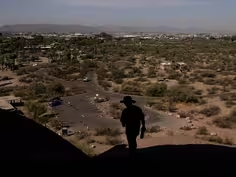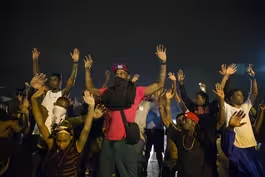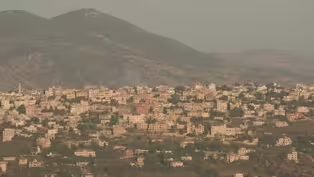
Israel kills Hamas commander in Lebanon with region on edge
Clip: 8/9/2024 | 6m 1sVideo has Closed Captions
Israel kills Hamas commander in Lebanon, strikes Gaza as region sits on brink of wider war
Israel continued its assault in southern Gaza by striking Khan Younis and killing at least 21 Palestinians, according to medics at Nasser hospital. Diplomatic efforts also intensified to head off Iranian retaliation against Israel for the killing of Hamas political leader and negotiator Ismail Hanihey. Geoff Bennett discussed more with Hussein Ibish of the Arab Gulf States Institute in Washington.
Problems playing video? | Closed Captioning Feedback
Problems playing video? | Closed Captioning Feedback
Major corporate funding for the PBS News Hour is provided by BDO, BNSF, Consumer Cellular, American Cruise Lines, and Raymond James. Funding for the PBS NewsHour Weekend is provided by...

Israel kills Hamas commander in Lebanon with region on edge
Clip: 8/9/2024 | 6m 1sVideo has Closed Captions
Israel continued its assault in southern Gaza by striking Khan Younis and killing at least 21 Palestinians, according to medics at Nasser hospital. Diplomatic efforts also intensified to head off Iranian retaliation against Israel for the killing of Hamas political leader and negotiator Ismail Hanihey. Geoff Bennett discussed more with Hussein Ibish of the Arab Gulf States Institute in Washington.
Problems playing video? | Closed Captioning Feedback
How to Watch PBS News Hour
PBS News Hour is available to stream on pbs.org and the free PBS App, available on iPhone, Apple TV, Android TV, Android smartphones, Amazon Fire TV, Amazon Fire Tablet, Roku, Samsung Smart TV, and Vizio.
Providing Support for PBS.org
Learn Moreabout PBS online sponsorshipAMNA NAWAZ: Welcome to the "News Hour."
Israel continued its assault in Southern Gaza today.
It struck Khan Yunis, claiming that Hamas fighters still operate there.
Israeli airstrikes killed at least 21 Palestinians, according to medics at the city's Nasser Hospital.
One airstrike killed a Palestine TV journalist, his wife, and three daughters.
Another strike smashed into tents, housing displaced people in Al-Mawasi.
That's an area Israel had designated as a humanitarian zone.
GEOFF BENNETT: Israel also confirmed it killed a senior Hamas commander in a drone strike in Lebanon.
Meantime, diplomatic efforts intensified to head off an Iranian retaliation against Israel for the killing last week in Tehran of Hamas political leader and negotiator Ismail Haniyeh.
The U.S., Egypt and Qatar called on Hamas and Israel to meet next week in a bid to settle remaining disagreements over a cease-fire and hostage deal.
For some perspective on all this, we turn to Hussein Ibish, senior resident scholar at the Arab Gulf States Institute in Washington.
Thanks so much for being with us.
HUSSEIN IBISH, Senior Resident Scholar, Arab Gulf States Institute: It's great to be with you.
GEOFF BENNETT: So, the U.S. Qatar and Egypt are calling for a new round of cease-fire talks on August 15.
These three countries have been trying to mediate a deal for months now.
Might this time yield a different result, in your view?
HUSSEIN IBISH: It is possible.
Even though Prime Minister Netanyahu authorizing a hit on Ismail Haniyeh, who was the main Hamas negotiator, at least in the first sort of wave of efforts you have to go through to get to Hamas and Gaza -- you have to begin with Haniyeh and then go through that -- killing him was not conducive to making a deal.
Let's put it that way.
However, I do think both sides could stand to gain from a temporary pause in the war.
Both sides would enjoy getting their prisoners back.
They would look for political benefit from that.
And I think as the war is morphing from the original Israeli campaign to kind of destroy everything above ground that's of value into an insurgency versus counterinsurgency that's kind of open-ended, which I think is the war Hamas wanted to begin with when they launched the October 7 attack, as that's been going on, I think both sides could use time to regroup their militaries to prepare for this next round of fighting, which both appear perfectly happy with and both appear to want to go forward with indefinitely.
GEOFF BENNETT: Well, this is the latest attempt by the Biden administration to end the war in Gaza, even as the region braces for an expected Iranian attack on Israel... HUSSEIN IBISH: Right.
GEOFF BENNETT: ... in retaliation for the assassination of the Hamas political leader, Haniyeh, in Tehran.
HUSSEIN IBISH: Right.
GEOFF BENNETT: So what more do you know about how and when Iran might respond?
HUSSEIN IBISH: Well, we don't know anything about it.
And what's really interesting is that time's a wasting, in the sense that you would have expected something more prompt if it was going to be a direct retaliation.
The reason that you haven't seen anything is probably the dilemma that Iran and its ally Hezbollah in Lebanon, which also lost their senior, most senior military chief of staff, Fuad Shukr, in a different Israeli assassination.
That's probably more of a significant loss to Hezbollah than Haniyeh to Iran, because Haniyeh was just kind of a figurehead, and the Iranian-Hamas alliance is a bit shaky.
But both sides are going to need to retaliate, because Iran was really humiliated by the way in which Israel exposed its penetration of Iranian intelligence by hitting Haniyeh in a safe house in Tehran.
The reason both of them have held back, in all likelihood, is that they're dealing with the dilemma of wanting to be seen to strike back and restore deterrence and show their continued strength without giving Israel either the reason for or an excuse for -- could be either, right, depending on which Israelis you're talking about -- to escalate even further because it is still true that neither Iran nor Hezbollah wants a regional war with Israel.
It isn't in their interests at all.
They have got caught up because of their own bad policies and their own mistakes in a series of tit for tat strikes with Israel, where Israel now has the advantage of kind of escalation dominance, you could say.
You know, they're the ones who are always pushing things forward.
And it's a difficult thing for Iran and Hezbollah to hit back without giving Israel another opportunity, excuse or need, depending on how you analyze it, to take the whole thing further towards a regional war that they don't want.
GEOFF BENNETT: So are you suggesting that Iran and its proxies are coordinating their response?
HUSSEIN IBISH: Without a doubt they're coordinating.
And Hezbollah leader Nasrallah said in his last speech, we will either act together or separately.
They're buying time, and they're buying time because they're in a bind, because they don't want a bigger war, but they have to do something.
And there have been many Israeli assassinations in Syria, in Iraq and in Iran that went unanswered.
This -- these could be other examples of that, but I don't think so.
I think both, Hezbollah especially, but also Iran, will feel the need to do something, but they really don't want to give Israel another opportunity to escalate even further because they fear a broader regional war, and a minority in Israel's cabinet does want a war for various reasons.
They think they can restore the credibility of the Israeli security state, and they think they can maybe deliver a strategic blow to Iran and its alliance, where so far in the post-October 7 environment, Israel has suffered strategic setbacks.
Iran doesn't care about Gaza or Hamas particularly, but they do care about Hezbollah, who's supposed to protect Iran from an American or Israeli strike, especially on Iran's nuclear facilities.
That's their role.
So Iran doesn't want to waste that Trump card on a place, Gaza, they don't care about, and an unreliable ally in Hamas.
GEOFF BENNETT: Hussein Ibish, thanks so much for walking us through all this.
We appreciate it.
HUSSEIN IBISH: You're very welcome.
Thank you so much.
Arizona's heat kills hundreds, threatens thousands more
Video has Closed Captions
Clip: 8/9/2024 | 7m 9s | Arizona's scorching summer kills hundreds and threatens way of life for many more (7m 9s)
Capehart and Johnson on if Harris can sustain momentum
Video has Closed Captions
Clip: 8/9/2024 | 11m 43s | Capehart and Johnson on if Harris can sustain the momentum and pressure on Trump (11m 43s)
How Ferguson has changed 10 years after Brown's death
Video has Closed Captions
Clip: 8/9/2024 | 4m 20s | How Ferguson has changed 10 years after Michael Brown's death sparked massive protests (4m 20s)
The images that have defined the Paris Olympics
Video has Closed Captions
Clip: 8/9/2024 | 4m 27s | The images that have defined the Paris Olympics (4m 27s)
Lebanon border devastated as Israel, Hezbollah trade fire
Video has Closed Captions
Clip: 8/9/2024 | 7m 39s | Inside the southern Lebanon border area laid to waste as Israel, Hezbollah trade fire (7m 39s)
A look at Team USA's golden run at the Olympics in Paris
Video has Closed Captions
Clip: 8/9/2024 | 6m 30s | A look at Team USA's golden run at the Olympics in Paris (6m 30s)
Providing Support for PBS.org
Learn Moreabout PBS online sponsorship
- News and Public Affairs

FRONTLINE is investigative journalism that questions, explains and changes our world.

- News and Public Affairs

Amanpour and Company features conversations with leaders and decision makers.












Support for PBS provided by:
Major corporate funding for the PBS News Hour is provided by BDO, BNSF, Consumer Cellular, American Cruise Lines, and Raymond James. Funding for the PBS NewsHour Weekend is provided by...






